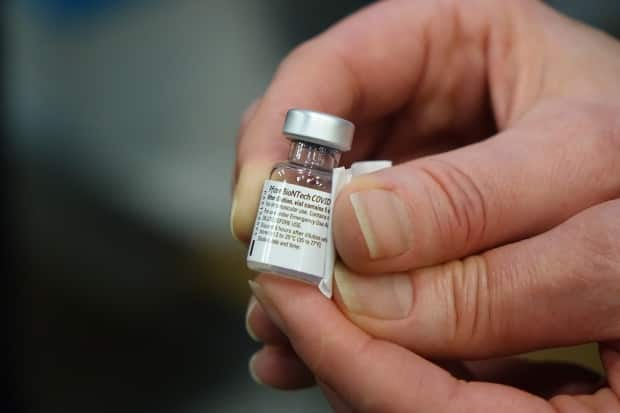N.L. ramps up vaccine rollout while setting single-day recovery record

Newfoundland and Labrador is reporting three new cases of COVID-19 on Wednesday, all contacts of previously known cases, as the province ramps up vaccine rollout.
There have also been 57 new recoveries, the highest single-day total since the pandemic hit the province last March. All but one of the recoveries are in the Eastern Health region, while the remaining recovery is in the Western Health region.
There are 149 active cases, and nine people are in hospital due to the virus.
Chief Medical Officer of Health Dr. Janice Fitzgerald noted the province has had several days in a row with only epidemiologically linked cases — cases that are linked to previously known cases.
Of the most recent 43 confirmed cases, 39 are linked to a previous case, one is travel-related and three others are under investigation.
"This is good news, really, and indicates that we are heading in the right direction," she said during Wednesday's COVID-19 briefing.
"Our testing numbers are down somewhat, which could indicate that there are fewer contacts and fewer people who are symptomatic. It shows that people are staying home and following public health guidance."
To date, 113,503 people have been tested, including 245 since Tuesday's update. All of Wednesday's new cases are in the Eastern Health region.
Vaccine effort will have 'significant boost'
Fitzgerald also said the province will extend the time first and second doses of COVID-19 vaccines to four months, with evidence suggesting that the first dose provides significant protection.
"Current evidence is suggesting high vaccine effectiveness against symptomatic disease and hospitalization for several weeks after the first dose of vaccine," she said.
Given the evidence and the province's limited vaccine supply, said Fitzgerald, the province will be extending the time between doses to four months, up from three weeks for the Pfizer-BioNTech vaccine and four weeks for the Moderna vaccine.
"This will allow us to protect close to 40,000 extra people with one dose of a highly effective vaccine by the end of March," she said.
"It will also help to prevent symptomatic disease, hospitalization and deaths during this most crucial time of high disease prevalence and limited vaccine supply."
Watch the full March 3 update:
Fitzgerald said Health Canada's approval of the AstraZeneca-Oxford vaccine will "significantly boost" inoculation efforts. She said all provinces and territories will receive their first shipments next week.
"Newfoundland and Labrador will receive about 7,000 doses initially, and we intend to start administering as soon as they arrive," she said.
The new vaccines and longer intervals between doses will mean the province can inoculate priority groups faster, Fitzgerald said, and provide a greater level of community protection sooner.
She said the province is still looking at who will benefit most from the first AstraZeneca-Oxford shots, and a plan is still being worked through.
As for those who are waiting on their second doses, or those with family members in congregate living facilities and long-term care homes, Fitzgerald said the more people who are protected, the more protected we all are.
"Allowing us to get more people protected will actually be of more benefit to their loved ones in congregate living settings, and making sure our society is protected faster is certainly going to help in the long run," she said, noting that anyone who is waiting for a second dose will follow the new extension.
Fitzgerald said loosening restrictions will have be done differently than last year because of the spread of the coronavirus variant B117. The Avalon Peninsula is in Alert Level 5, while the remainder of the province has moved to Alert Level 4.
"We do have to be more cautious with regard to how easily this can spread. It is going to change what we have to do with regard to gathering sizes. It's going to change what we have to look at with regard to those situations where people get together in groups such as sports," she said.
"We do need to think about how we're going to deal with that going forward, given that we have this opportunity now to try to get as many people vaccinated by the end of June or middle of July as possible. I think we really need to double down on our efforts."
Vaccine shipments increasing: Furey
Premier Andrew Furey said shipments of vaccine are increasing, which accelerate the province's rollout plan.
"Our goal, here at home, is simple — get everyone in Newfoundland and Labrador their first vaccination as quickly as possible," Furey said.
Furey said the province is on track to have more than 80,000 people vaccinated by the end of the month.

Health Minister John Haggie said public health's vaccine administration capacity is "nowhere near even challenged" by the numbers the province is anticipating in deliveries over the next month.
"It's running at less than 50 per cent, and that's without involving our other partners such as our pharmacists and family physicians who stand ready to join in should we find ourselves in the lucky situation of having even more extra vaccine," he said.
"We have stockpiled and pre-staged syringes and supplies necessary for administering the vaccine through the regional health authorities, and there's no supply limit on PPE for people called upon to administer the vaccine."
Haggie said more than 46,000 people, out of an eligible population of around 76,000, had pre-registered to have their first shot of vaccine as of Tuesday night.
A day ago the province reported its first COVID case in a paramedic. Haggie said a "modest number" of paramedics have been vaccinated, particularly those who work for the province's regional health authorities.
The province has first responders at the front of its COVID-19 vaccination line, Haggie added, and the province is looking into how best to deploy vaccines in a "justifiable, evidence-based way."

